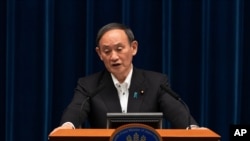Japanese Prime Minister Yoshihide Suga announced Friday the government will extend COVID-19 state of emergency measures for Tokyo and surrounding prefectures by three weeks, to May 31, because infection rates remain high.
Suga told reporters Japan’s emergency measures, less strict than blanket lockdowns in other countries, have been effective in keeping people from going out. But numbers of new infections in the nation’s major cities remain high and he said, “hospitals continue to be overwhelmed in Osaka and Hyogo prefectures."
The state of emergency restricts commercial activity, with bars and restaurants told to close or stop serving alcohol, and movie theaters and karaoke parlors closed.
Suga sought to reassure those who are concerned about the wisdom of hosting the Olympics — scheduled to begin July 23 — during the pandemic, saying that played a role in the decision. “By carrying out these thorough measures we will protect citizens' lives and health. We believe it is possible to realize a safe and secure Olympics and want to make firm preparations."
The prime minister praised Pfizer's offer of vaccinations to all Olympic and Paralympic athletes, noting that Japanese athletes are highly likely to get vaccinated before the games as well.
While Japan’s pandemic has been less severe than other major countries, its vaccination program has been much slower, with about 1% of the population totally vaccinated. He pledged Friday to speed that up, with the goal of vaccinating a million people a day, and having the nation’s elderly fully vaccinated by the end of July.
Tokyo reported 907 new COVID-19 cases Friday, compared to 635 when the state of emergency was reimposed last month. Overall, Japan says it has seen 622,273 cases and 10,566 deaths since the pandemic began.
Japan Extends COVID-19 State of Emergency to May 31
- By VOA News








